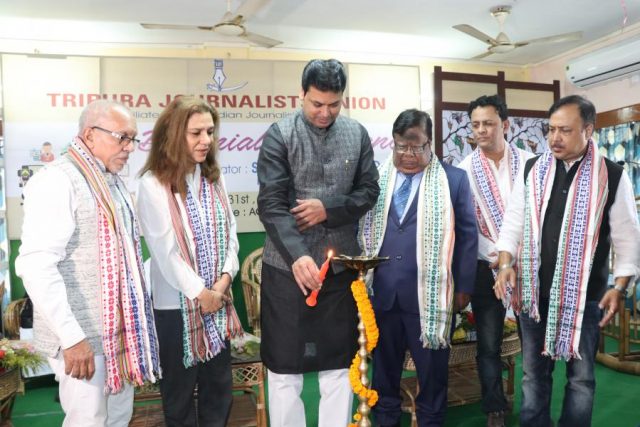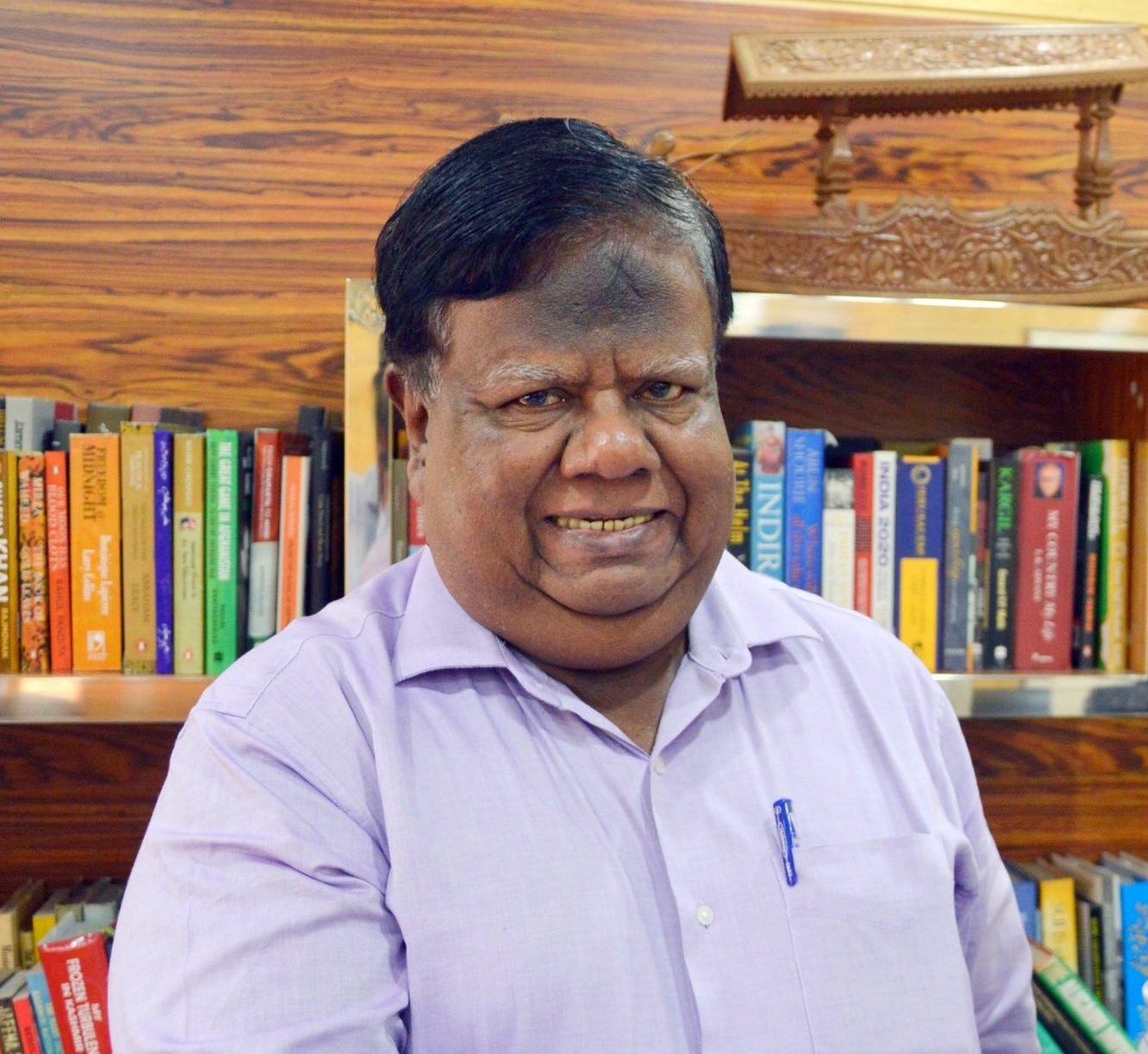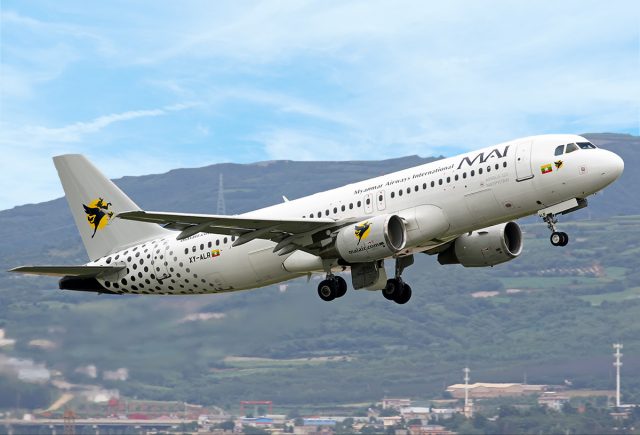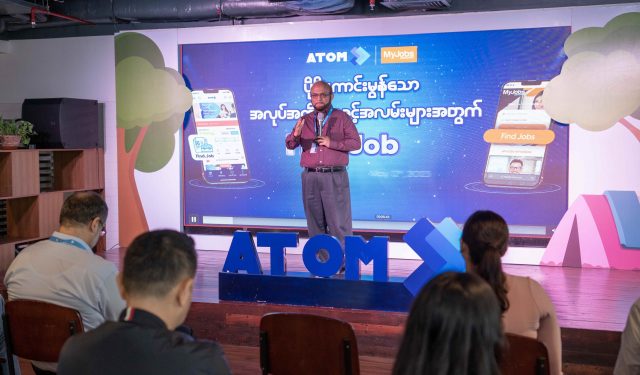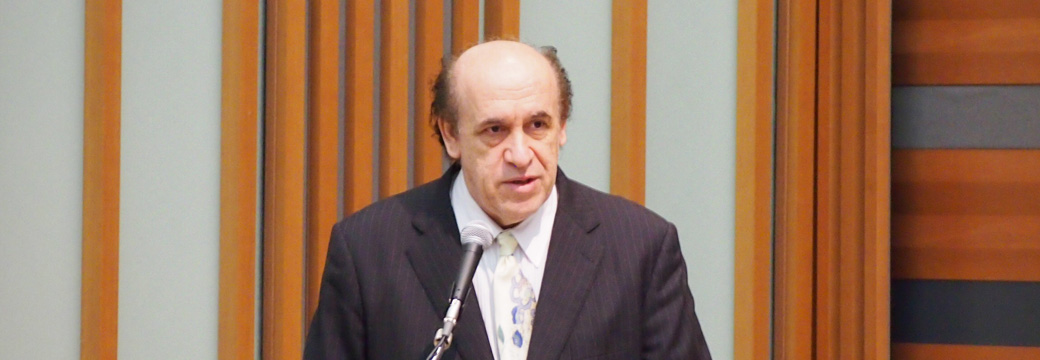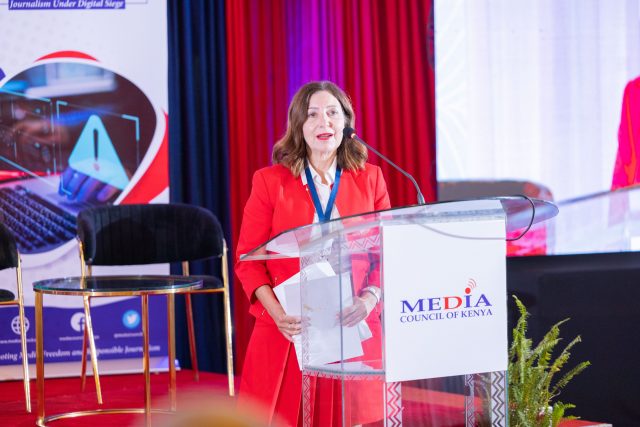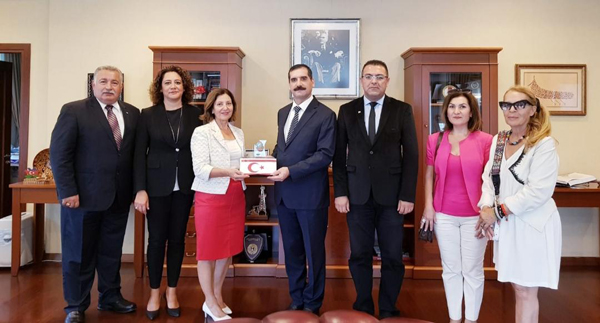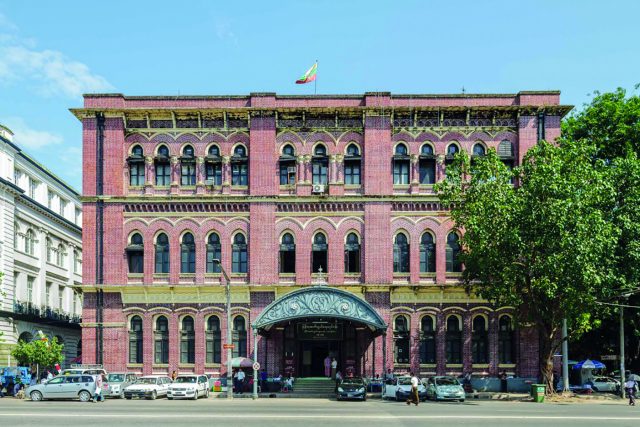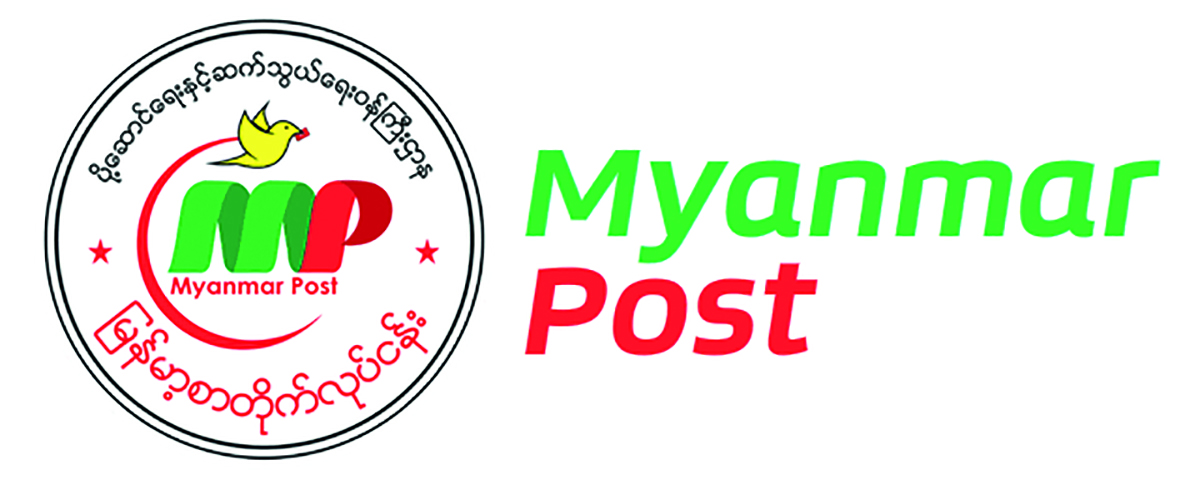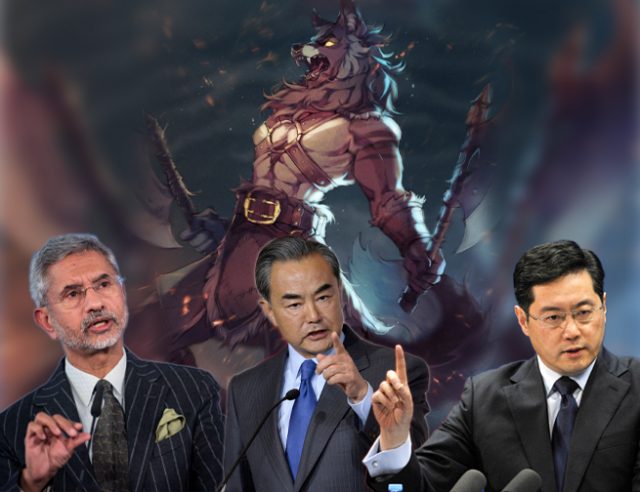Interview with CK Nayak, President of Indian Press Association
How would you describe India relationship with Myanmar historically and at present?
Our two countries have always been good friends, good neighbours from the time all of us can remember. We value that friendship. Obviously, just like all friends and neighbours, there may be occasional hiccups and stuff. But at the end of the day, we care about our neighbours and I can say we are very good neighbours.
How powerful is IPC in India? How is it dealing with the shrinkage of traditional media and expansion of digital media?
The aim is not to have power. The aim is to have freedom of press, the full freedom of press and uphold standards of journalism. That is for the traditional media side. When it comes to the expansion of digital and electronic media, what Indian government and India Press Council has been doing to to set up India Media Council, where all the media will come under one umbrella. It is not that the Press Council cannot deal in anything involving electronic media. It is just that everything would come under one umbrella.
It will take time to set up, with members from all media channels involvement. We have already submitted the proposal to Parliament. Hopefully, it will be done soon.
Is the raiding of BBC offices got something to do with, BBC show on PM Modi?
It is my personal view that any organisation, be it media or anything else, has to abide by the law of the country that they are operating in. Today if any media company of India goes to Myanmar, they have to follow Myanmar laws. The raid is regarding the accounts or compliance or relating to employees. May be it is a coincidence that the show on PM was aired around that time too. There is nothing beyond that. The baseline is every organisation has to go by the law of the country.
In this world of fake news media outlets, how is India and IPC handling them?
That’s where the media council would come and deal with everything, electronic media, digital media, broadcasting, etc. Everything. Once the media council is established, everything will come under the media council.
What if the fake news outlets are based overseas? How would you tackle?
That is a real problem. We acknowledge that. Especially in regions like Kashmir, we found many WhatsApp groups spreading fake news. They use servers outside of India. And hopefully, they could be controlled too.
Obviously Jaishanker has been quite famous, at least in this part of the world. How likely it is that the future of India external affairs be headed by wolf warriors like him?
It is a coined term. Jaishanker is certainly not a wolf warrior. He is a good man. He is a career diplomat and a professional. He was then a foreign secretary before becoming a foreign minister. It is a politician, but not a wolf warrior in that sense. As far as the current policies are concerned, you can look at a lot of things. India is the largest democracy in the world. It is going to have the largest population. What we have been saying that with this sizeable population, India has its own concern and we have to heed theses concerns.
How do the majority of India population view the West?
Unlike the popular perception, we are not bothered about the West or any other country. We are bothered about India only. And of course, our neighbours. Because we co-exist with them. We do not live with the West or Russia. We live with our immediate neighbours. So we are concerned about them. We are more interested in how our neighbour Myanmar is doing than how England is doing. Obviously we have a large India diaspora overseas. UK Prime is Indian. So is Kamala Harris. We also have lots of Indians in Canada. We are concerned with them too. But we are not particularly obsessed with the West.
UK PM is an Indian, US VP is of India decent, many Indians also heading famous tech companies. What does India need to do in order to make this century India’s, instead of China’s?
The two countries are poles apart. One is a democracy and one is a communist country. Both are economically liberal at the same time. The competition should be healthy. Whom the century will belong, it will eventually depend on the people. It certainly does not depend on the leader or anybody else. Indian is a young democracy. It has a young population. It is secular and has diversity. Our population of one state alone exceed that of the whole of Myanmar.
Myanmar Airways International (MAI) Launches Mid-Year Sales to Celebrate Network Enhancement
Myanmar Airways International (MAI) celebrates its network expansion by running a special Mid-Year Deals campaign with airfares starting from just $ 59 across its entire network, with the applicable travel period from May 8, to Oct 28, 2023. MAI introduces the campaign in conjunction with comprehensive network enhancement across the board, including its weekly Yangon (RGN) – Chennai (MAA) services eff. May 6, 2023, frequency increases to existing routes: Singapore (SIN), Dubai-International (DXB) and Seoul-Incheon (ICN), plus, the sales launch of 5x weekly services to Don-Mueang (DMK) from both Yangon (RGN) and Mandalay (MDL).
Tanes Kumar, Chief Commercial Officer (CCO) of MAI, said: “Our Mid-Year Deals is our way of appreciating our guests & trade partners for the immense support received post-pandemic, which allowed MAI to reinstate and expand our network rapidly. Guests stand to enjoy attractive one-way fares starting from $ 61 only on our 18 international routes, including to well-known cities such as Bangkok (BKK), Singapore (SIN) & Kuala Lumpur (KUL), or newer destinations such as Hanoi (HAN), Ho Chi Minh (SGN) & Phnom Penh (PNH). In addition, we are proud of our direct services to Chennai and the recently announced five weekly flights to Don-Mueang International Airport (DMK) in Bangkok, effective June 15, 2023. Based on the expected demand recovery, we are also happy to share that MAI will increase our frequencies to Singapore (SIN), Dubai-International (DXB) & SeoulIncheon (ICN) effective May 2023 onwards. We hope our guests & trade partners will continue supporting us as we collectively work towards the continued recovery of the Myanmar travel & tourism sector.”
MAI officially inaugurated its direct services between Yangon (RGN) and Chennai (MAA) on May 6, 2023 with a special ceremony at the Yangon International Airport.
Chennai will be MAI’s fourth destination in India, after Delhi (DEL), Kolkata (CCU), and Gaya (GAY), and the first in South India.
MAI also launches five weekly flights from Yangon (RGN) & Mandalay (MDL) to Bangkok-Don Mueang (DMK) effective June 15, 2023, becoming the first carrier to serve both airports in Bangkok, further solidifying MAI’s position in the Yangon – Bangkok market with a total of 40 weekly flights. Guests can now enjoy MAI’s full-service option on this segment, with 30KG baggage allowance and complimentary inflight meal compared to existing services.
Flights to Singapore will be increased from 10x weekly to 12x weekly effective May 29, 2023, with new flight frequencies every Monday and Wednesday. Dubai-International (DXB), meanwhile, will be increased to 3x weekly from the current 2x weekly effective June 1, 2023, with additional flights every Thursday. Lastly, Seoul-Incheon (ICN) will be increased to 4x weekly from 3x weekly, with an additional flight every Thursday, effective July 27, 2023.
ATOM and MyJobs Myanmar Collaborate to Launch Find.Job
ATOM, and MyJobs Myanmar (www.myjobs.com.mm), have partnered to launch Find.Job, a new job portal feature in the ATOM Store App. Find.Job offers access to thousands of local and overseas job listings, along with resources to support job seekers with their professional development and career-building pursuits.
As more people turn to online and mobile platforms to search for jobs, the Find.Job portal is expected to become a valuable resource for job seekers across Myanmar. The partnership leverages data from the MyJobs Myanmar online platform to provide job seekers with a range of job listings including job vacancies at ATOM.
Job seekers can make use of filters as they conduct job searches in Find.Job, including to sort job listings by location, job type and company. Find.Job also offers useful features such as ‘Feature Profile’, which allows job seekers to create their profiles, and have it showcased on the MyJobs platform. In addition, article and video resources which focus on employment, professional development and career building tips can be easily accessed in Find.Job.
Said Mr. Muhammad Ziaullah Siddiqui, Chief Executive Officer of ATOM Myanmar, “With the launch of Find.Job, we are taking a significant step towards supporting the professional development and career aspirations of our customers. The portal offers a convenient job search experience to enable job seekers to identify job opportunities both locally and abroad. We will continue to innovate in collaboration with partners such as MyJobs Myanmar to expand the services and value that we bring to customers through the ATOM Store App.”
“MyJobs is a leading platform that understands the core job requirements of employers and helps job seekers secure roles to develop their talents The Find.Job portal offers comprehensive tech-based support to job seekers at every stage of their career path,” said Daw Mya Thandar Oo, Chairwoman of MyJobs Myanmar.
To access Find.Job in the ATOM Store App, ATOM customers can tap on the ‘Lifestyle’ tab and then tap on the Find.Job icon. There is no subscription fee required to access Find.Job. Job seekers who wish to apply for the jobs listed will be directed to the MyJobs Myanmar website and will be required to create an account.
An Interview with a Veteran Correspondent, Ex-Chairman of Foreign Correspondents’ Club of Japan
Not Tom Cruise and Brad Pitt type (movie: An Interview with a Vampire) perhaps. But pretty close.
A bit about yourself pls.
I am Khaldon Azhari. I am a journalist based now in Japan. I represent some Arabic media and Pan Orient News. The latter is also my company, set up in America, with a branch in Japan. I cover mainly east Asia countries and their issues. I am also a chemical engineer but I like to work in the media. It is my passion and my direction.
This being the first time in Myanmar, how was your impression prior to this visit?
Before I get here, the impression was, the same as in the news headlines. Myanmar seems to have some issues, first with the Rohingyas (illegal Bangladeshi immigrants) people, then with the sanctions and finally the attacks by Myanmar military. So, it is rather not positive news, especially when it comes to the clashes with the muslim people. The initial impression was that there was a religious cleansing as it was projected mainly in the digital media. There was also news about a military coup that toppled a democratically elected government in Myanmar. With all these going around, it is rare to find any positive or nice news about Myanmar.
There was also ASEAN expression concerns about Myanmar and Japan condemning about this or that. It is mostly negative in the last few years. I personally do not believe any place is 100% negative. There is always a background to each issue and each story. This year, I put myself to explore the countries that have issues with the UN and that include Myanmar and I am so glad that I started here.
What actually was the objective of this trip?
The objective of this trip was to see firsthand the situation and to see the daily life of the people in Myanmar, not necessarily the political issues or policies and how the society is working out. The first thing to know about a country is to see the people going about their normal lives. I have an extremely good feeling about my first impression on the country. It is very smooth, peaceful and normal. I do not feel I am in any special situation or environment. It looks very much like people are going on about their daily lives, I noticed especially families on the motor cycles. It is very nice to see, even though it looks dangerous for riders. Anyway, the impression is very good and it looks much like a traditional society. I may be very conservative but I like the traditional society.
What were your unique experiences during this trip?
So far my trip is not finished yet. I visited some resorts. I feel that the nature factor is very beautiful in this country. I see trees everywhere. Life goes very smoothly here. I do not feel stressed out at all. There is very relaxing ambience everywhere. Unlike living in a big city such as Tokyo, it is not stressful here. I do not mean any positive or negative about that. Just the lifestyle. So far I do not have any reasons to leave Myanmar soon. I would rather stay longer to explore the country more.
There was once incident that I like to mention. As we were coming down from Nay Pyi Taw city to the airport, our car got a tyre puncture. The two people who were just passersby on the road, stopped their makeshift vehicle and helped us change the tyre. That was amazing. They just did it and left. They did not expect anything and did enthusiastically. I felt this represents the nature of the feelings of the people and they like to help each other without expecting anything in return. It was a very special experience.
I also met some ministers here. I have the first hand experience on their explanations on the current situation and these sounded very reasonable to me.
As a correspondent, what would you say are the most common misconceptions about Myanmar?
I wanted to tell you what happened to me when I told some of my close friends and family members that I was going to Myanmar. They all expressed immediate concerns and feared that I was endangering my life. It was not like I might be robbed or lions might attack me in the jungle. It is an expression about life threatening atmosphere in Myanmar. Of course, I personally do not think so because every time there is media hype about something, we know that is not exactly the case. They actually told me it was dangerous and I might be killed because I was a muslim.
I do not think there is anywhere in the world where you might be killed because you belong to a particular religion. I was really surprised how much these people have these negative images of Myanmar embedded in their minds. It’s unbelievable.
Yes, there might be clashes somewhere for whatever reason, but it does not mean that the whole country is in danger zone for people belonging to certain religion. I know that without any evidence, this kind of conception is wrong. This is hype, propaganda or fake news. I know that for a fact. But I wanted to experience myself and I have zero concern about my safety from this kind of threat. So far it is absolutely the opposite of the outside world conceptions. Actually, I feel too safe here.
Why do u think this type of misconceptions happen?
Obviously because of what happened during the Rohingya problem. There was a lot of reporting about it in an exaggerated way. It was reported as if there was a religious cleansing, based on your ID. ‘Show me your id. If you are a muslim, you are killed on the spot.’ That was the conception.
I remembered I saw a video once, that claimed somebody is burning a muslim kid alive. I went on to check the authenticity of the video and we realised it was absolutely edited. I then realised somebody was trying to ignite confrontation. May be there were some clashes, of course, it happened everywhere. I do not want to say anything about it because I was not there. I was not following these news. I have no real opinion about it.
The way they projected the event as religious cleansing, I felt it was not correct. I know there are many muslims living normally in Myanmar. There are many mosques there. And I be doing Friday prayers after a couple of hours. If there is cleansing, it should have been done long ago. And the mosques would not be here in the first place.
I saw on some reports that there was an ethnic problem. It happened everywhere. I would like to cover more on the issue. As a journalist you have to find the truth, report the truth. We report – you decide. We are not part of any party, basically.
What approach should Myanmar take to address these?
The approach is very clear. Just open it up. Let the international media come and see first hand the situation and report about it. Because second hand reporting from people with agenda or with too much religious feelings or from people with half information are very dangerous. If I go there, I would interview people, and I will see what is happening on the ground. Yes, there might be tragedies. But, our mission is to find out why these tragedies took place and if it is just disputes between ethnic people, it happened all over the history of mankind.
The first thing for Myanmar government, is to open up for foreign media, especially from the countries related to the issue, ie., muslim countries. Invite journalists, representatives and mediation parties from these countries, to come and see, talk to both sides and lets solve the problem. If it is a complicated ethnic problem, as I read, then Myanmar should show that we are trying to solve it.
I heard from the Minister for International Cooperation that they are starting to have the returnees back to Myanmar. That is a very good action to solve the problem. If the government allows the stakeholders to come here and participate in the negotiations and help at least, that would be very helpful to show the good intentions and the fact that we are not what you say.
How about immediate steps?
Of course, I m not a position to tell Myanmar government what to do. But if I am in such a position, I would send missions to all islamic countries. And I would invite immediately some representatives from these countries, and I explain to them on the ground what happened and I would allow free exchange of opinions. I will let them take photos and interview anyone they want. Total openness. That will help to restore the trust immediately, which is the first ingredient to have a new start. Myanmar has a good potential to have good relations with countries all over the world, including muslim countries and especially Arab countries.
The best way is to talk to each other. Human exchanges are very crucial at this point. Instead of letting the parties who has nothing to do with the conflict report about it, we can set the narrative.
What would you say to those who said Myanmar government is killing Muslims across the country?
I think this is absolutely not true. I could not say anything to them because I do not think they are going to be listening to me. It seems they are going on with their agenda regardless of the facts. I seriously do not believe Myanmar has any interest in killing muslims. Absolutely not.
Yes, there might be some issues in Rohingyas. I heard that they came from Bangladesh long time ago and settled. They came from British India to participate in farming. So there is the historical background. And it is normal to have clashes with the locals. It’s human nature actually. We cannot avoid that. If Myanmar wanted to kill these people, they would not let them come in, in the first place.
Myanmar people did not come from some other place and settled here. They are the original people, unlike Israel, e.g. I think this kind of media propaganda or social media spreading of fake news, you have to see who is behind it. Any videos of any attack can be created in any studio across the world. I can be in a studio in New York and present as if I am in Myanmar. Government here, should also chase to some extent, those who are behind these fake media stories and try to establish facts and show this is not what is going on.
Of course, I cannot say something happened or nothing happened, but it does not make sense that the government is killing people that easily. It seems to me that a problem suddenly broke out somewhere and it developed. May be it surprised everybody so no appropriate steps were taken to solve it on the spot. Then it escalated and outside forces ignited the escalation to a whole new level.
I think we need to talk to the right people and show that the country is normal like any other country. That problem is a problem yet it is not like what the outside world think, basically. I like to go to that area and explore myself in the future.
In terms of responding to international propaganda or fake news, so far Myanmar has been on the defensive side. What would you not recommend being defensive all the time?
Because you are dealing with adversaries who are going to attack regardless of whether you are right or wrong. But as they say in soccer or football, best way for defence is attack. But in Myanmar case, the best way for the attack is to attack. You need to attack the case, you need to go forward very aggressively and you have to set up immediate goals and present them powerfully.
I think you need to take steps everyday, e.g., there is a G7 meeting coming, you need to send a pre-emptive message to G7. If there are sanctions and you think these are unfair, you send them a message, instead of waiting until they send messages of condemnation. We should act proactively instead of just reacting to negatives from others.
Developments in Global Media Landscape Interview with Sule Aker, Chairwoman of World Association of Press Councils
What’s WAPC all about?
We were established because there was a lot of problems with journalists and media members. So we talked and came together to support each other in order to create more opportunities for press freedom and of course, responsible journalism. We are not only one sided but also thinking about the public and the fact that they have to have the correct news. We think that it is important that all participants of the media industry should be respectful to each other. That’s how and why we were established.
When it was established, there were twelve members countries. Now we have twenty six and it is becoming more powerful and we can achieve more because our members are really unified in pushing for press freedom and responsible international journalism. It has been quite an achievement for the council and also for our members.
How has it changed over the years?
It changed a little bit. Yes, we have the same ideals, such as press freedom and responsible journalism. Also, in the media sector, there are new things happening with the new technology, social media and internet journalism. All of that pose a lot of challenges to the council and when our members come together last year in Kenya, we decided that we have to develop a code of ethics for social media as well. Because social media has become an instrument to defame certain people for political purposes, which we think it is not fair. We believe we should have a code of ethics for social media as we have in journalism.
We would protect the journalists and reporters, at the same time, how about fake news agencies that farm out falsehoods and reporters who write these?
Thank you for asking me that. It has been one of the major challenges for WAPC. Unfortunately, there are some participants in the media, who sometimes write or make fake news and it may not be very easy to correct these fake stories. And it is worse, if nobody complains or point out these fake news. It would stay on the digital media forever. Even in the US, very eminent people are complaining about fake news. Of course, we are against it. We feel that journalists, media workers, should have the responsibility to general public. We are addressing these too and we should be writing just and unbiased news. If the journalist take the opinion from one side, they should express the opinion from the opposite side too, to have unbiased news.
We are very sensitive about those things, but how much we can extend ourselves is limited and sometimes, we cannot really reach certain places all around the world.
How does Turkey/Cyprus handle fake news?
This is a problem because sometimes, it may not come to us. Because there was so much social media that fake news are everywhere. Most of the postings there are fake stories. We are very frustrated because we cannot do anything about it. First, one has to follow every single digital media outlet or news posting. It is impossible especially for a non-governmental organisation like us. The second thing is every if you find the source of the fake news, the process took so long and people forgot about it. You found and tracked the fake news down. And if you make announcement one or two months later that countering the fake news with the correct chain of events, people really forget about what was the news, in the first place. So, it should be framed in such a way that the response is very fast. Then the people would have sufficient memory to replace the fake news with the correct version.
These are great challenges faced not only by WAPC but also many countries all over the world, who still do not know how to deal with fake news. Many countries still have no punishment or penalties for fake news spread over social media. Based on our resolution of our last meeting in Kenya, we decided the same code of ethics for traditional media should be applied for digital social media. Also for punishment and penalties.
What is the solution to tackle fake news, especially in developing countries, with a semi-educated population?
In such a case, the better idea could be having an office, a special office, following news and assessing the correctness of these. People then have channel to report and fake news could be stopped before they harm the general public. That office could follow the general media as well as the social media. If there are any fake news harmful to society or public, it should be cleaned before it spreads. That office should be handled by the government, especially in these countries. There should be penalties and punishments for harming society too.
How do you handle pressures from US and Russia, with Turkey being part of NATO and neighbour of Russia at the same time?
I totally understand what you are saying about Myanmar being caught between the giants and being part of geopolitical game play. Turkey is also between giants like European Union and Russia with a lot of power play from the US too. That type of position requires extremely delicate handling because you do not want to be fighting or going against any of the giants. I am sure Myanmar people are very intelligent and they can develop the best strategies for themselves. I know it’s a very difficult position to be in. I hope all the best for you.
Obviously Turkish PM continues to accuse MM of Rohingya genocide, yet, it is not true. What would be the best way to resolve that?
Under this type of situation, there may be fake news, complaints, disputes, propaganda, etc. The best thing is to communicate. Communicate with each other. If we do not understand each other, we cannot never reach a resolution. So the first step should be to try to understand each other much better and try to solve the problem by coming together. I think this would be the best idea hurting nobody and protecting all sides interests at the same time. I always prefer that strategy.
How powerful is press council in Turkey? How is it dealing with the shrinkage of traditional media and expansion of digital media?
We are somewhat powerful, because there is freedom of press here and also responsible journalism. If there is any deviation from responsible journalism, we make a point to address the situation and take control of it. So we do have press freedom and responsible journalism in all aspects of our country media, except for social media. Social media is totally out of control, unfortunately. It it sometimes really harmful to the people.
How do majority of Turkish population view US and Russia?
That again, is the strategic position Turkey has to take delicately. There is definitely anti US sentiment because Turkish people think that sometimes US interests and Turkish interest can be conflicting, in certain areas. Hence, they react. But we also know that Turkey is a nato ally militarily and the country is following a market economy system. So economically and militarily, we are somewhat allied with the West.
No Plan to Change Reference Rate

Central Bank of Myanmar (CBM) has no plan to change the reference exchange rate and it will maintain USD liquidity and Kyat Liquidity through market operations, according to the CBM’s notification released on May 26.
To stabilize and enhance the FX market, the CBM has been providing liquidity through local banks. It helps reduce the need for US dollar liquidity and Kyat liquidity for the businesspersons and stabilize the exchange rate, the statement mentioned.
CBM also warned the people of spreading malicious rumours regarding the FX market. Investigation and prosecution of market manipulators who try to hike the exchange rate by disseminating false information will be undertaken under existing laws. General public can tip off on the manipulators and their operations via CBM’s email: gov.office@cbm.gov. mm.
May the Post be with You!
Brief History
Long before your time, in 1872 to be exact, in the western most city of Sittwe, there opened the very first post office, a precursor to the present day Myanmar Post. Under colonial rules, the post was separated from British India with Myanmar’s own Post and Telegraph administration. Since April 2015, it has been existing as a separate entity for nearly eight years. It is solely owned by the government.
Changes in the recent past
The tracking of the articles (for delivery) already existed since 2009, albeit offline. Delivery monitoring system started in 2017 where customers could start online viewing of the status of their parcels via myanmarpost.com.mm. Just like post offices in other parts of the world, services for fund transfers, collection of behalf, bill payments, purchasing of various forms of tickets are also available at the post.
The other key revenue drivers include international mails and express mail services, where Myanmar Post has won awards at various levels on quality of delivery management services.
The average customer profile has also altered after the entrance of private delivery service providers into the market. A significant portion of the customers include online shops, government departments and banks at present time.
Product development is one area where major changes occur in the past ten years. Cash collection on behalf for online shops, smart lockers, smart envelopes, post boxes rental, express last mile delivery and being agent for mobile payment providers are new services in the last decade. Meanwhile, the usual services continued; mail, parcels, stamps sale, etc.
The relevance and competitiveness
In the era of privatisation and liberalisation, Myanmar Post seems to be restricted in terms of staffing, funding and management compared to private players. From staff incentives to punishments, hiring to firing, funding to spending, it is not hard to imagine why a government entity would not even be half as mobile or competitive as private enterprises.
Yet, when it comes to being accountable, secure and reaching out to unreachable places, Myanmar Post stands out from the crowd. Other than Myanmar Post and companies like rgo47, you would be hard pressed to find someone to deliver a package to Hpar Kant, the jade mining area in Kachine State. Its reliability and complete tracking ability continue to ensure that the Post is one most relied upon by businesses and government, especially when it comes to sending important or expensive documents or parcels.
The events of the past two years have not been kind to Myanmar Post. It is one of the entities targeted by NNCP terrorists, particularly through online social punishment and cyberbullying, stirring up and sometimes forcing the population to discourage the use of the nation’s Post. After losing about 80% of its volume immediately after government changeover (February 2021), it has now mildly recovered, getting back close to half of its 2020 numbers.
Something to you might not be aware
- Do you know that Post office offer volume discounts of up to 20%, to organisations that send out multiple mails or parcels?
- Do you know that Post office send for free to libraries for the books that you would like to donate to them? Or at minimal rates if you are a publisher?
- Do you know that you can see your own postcode at the Post website?
With affordable prices, extensive reach and continuous quality improvements, Myanmar Post would continue to stay relevant for many years to come and be of use to everyone everywhere in Myanmar.
In Need of a Wolf Warrior
What do Jaishanker, Wang Yi and the latest Qin Gang have in common? They belong to the clan of what media termed as the wolf warriors.
Even though internet defines wolf warrior diplomacy as confrontational and combative, with associated policies on social media and in interviews, as well as using physical violence against protestors and dissidents, the approach has been a breath of fresh air for many non-Western countries, trying hard to stand on its own two feet, fighting propaganda and fake news agenda.
Russia has been for years, trying to fight Western agenda. China created the wolf warrior approach. India now has its own warriors. Even African countries are following suit. We can now see how Namibia President talking back aggressively to President of German parliament or Congo President shutting down French’s Macron at a press conference, following the examples of the big three. The West simply cannot get rid of their colonial attitudes and the feeling that they are superior beings and hence Asians and Africans should kowtow to them. That innermost feeling propels them into thinking that they always have a right to be above everyone else or be the judge in the international community and have a free-pass to meddle in the internal affairs of other countries.
The Western world participation in internal conflicts or individual nations were undeniable, waging proxy wars or turning countries into failed states, in the context of planting democratic trees that would bear fruits of democracy. Look at Iraq, Syria, Libya in the recent past. I am sure citizens these three beautiful countries are so full enjoying the fruits of democracy tree planted by the Americans. Vietnamese people were eating oranges given by the Americans during the 1970s, those with the term ‘agent’ in front.
According to a recent article in the Economist, since 1991, there has been a 12 fold increase in proportion of civil wars involving foreign forces. Foreign meddlers have fewer costs – their own cities not destroyed, so they have less incentive to make peace. Plus weapons to fuel the wars came mainly from the West, beefing up the coffers of weapon manufacturers. As Murdoch said at Fox trial, “It’s not about red or blue, it’s all about the green!”.
Civil wars are already concentrated in hot, poor countries; as the climate grows harsher, the belt of bloodshed around the equator will surely grow wider. And based on cost benefit analysis, conflicts outside of the West, created more benefits for the West. Cost are minuscule as most went towards underground activities, rights groups and NGOs, to encourage more infighting and hatred, through propaganda and fake news stories. We always wonder why it took China less than a month to facilitate peace between Saudi and Iran (Sunni and Shia) when it took the West forever. May be they do not want them to have peace.
How about Myanmar?
With all the western world media only having negative views about Myanmar, it is high time that we train our own group of wolf warriors to confront and combat the fake news and undue influence, underneath the veil of democracy. As I mentioned in my previous ‘Where the West got it Wrong’ article, they refused to even listen to the elections fraud, let alone acknowledge it. They continued to support NNCP terrorists, despite undeniable evidence of their terrorist activities and put forward one sided resolutions, accusations and sanctions against the current administration.
When asked about how Myanmar should respond in such circumstances, ex-FCCJ chairman, Khaldon Azhari said, “Because you are dealing with adversaries who are going to attack regardless of whether you are right or wrong. …. the best way for the attack is to attack. You need to attack the case, you need to go forward very aggressively and you have to set up immediate goals and present them powerfully.” Otherwise, Myanmar keeps on getting bullied by the West as well as some countries of ASEAN.
So far, Myanmar has been so defensive in its approach that the fake news and negativities are drowning out the facts. We need our own pack of wolf warriors, who would fight back, be it at press conferences, meetings, panels or seminars. We need more wolf warriors courageous enough to stand in front of a hall full of audience and speak the truth, the whole truth and nothing but the truth. We need fearless fighters who would be proactive to fight for Myanmar’s interest all the times.
We do not need civil servants who just issue statements, denying this, objecting that, in the confined spaces of national press. We do not need associations who would issue statements at government request condemning terror attacks, while not daring to speak at all, in front of an international crowd or explain about the reality in Myanmar to an international audience. See the empirical evidence of how far being reactive has carried us. Nowhere!
As Reagan said, at the Challenger disaster memorial in 1986, “the future belongs to the braves”! The three great dynasties of kingdoms of Myanmar were started by three brave kings, namely, Anaw Yahtar, Ba Yint Naung and Alaung Pa Yar. Whether we want to be infamous like King Thi Baw or renowned and celebrated like the former three, it is up our current generations of leaders to determine, how our current strategies and actions would be recorded in history. The future is in our hands. Most of our leaders would agree that the search for a talented pack of wolf warriors is critical, be it a small step yet it would be a giant step towards securing a place for Myanmar to stand tall in this world.
Governance of Ai
Chatgpt was released in Nov 22. It gathered a million users within a week. And 100 million within 2 months. This generative ai has been so good and powerful that the potential of a doomsday scenario has been voiced out by many including Elon Mask and Steve Wozniak.
Prior to the launch, in August 2022, ai Impacts, US research group, surveyed 700 machine learning researchers about their predictions on ai risks. The result yielded a 5% probability of ai causing ‘extremely bad’ outcome, such as human extinction.
Li Fei Fei, ai luminary at Stanford, talks of a ‘civilisational moment’ for ai. Geoff Hinton, ai bigwig from Uni of Toronto, said, the judgement day is not inconceivable. Robert Trager of Centre for Governance on Ai, said one risk of such large language models is “making it easier to do lots of things – and thus allowing more people to do them (harm)”
In a recent survey of super forecasters and ai experts, median ai expert gave 3.9% chance to an existential catastrophe (<5,000 humans survived) owing to ai by 2100. Median super forecaster, gave only 0.38%. The difference may be probably be due to field selection bias by ai researchers.
So, how do we control ai?
Before Chatgpt4 (C4), openai used several approaches to reduce risk of accidents and misuse. One is called ‘reinforcement learning from human feedback’ (rlhf). Rlhf asked humans to provide feedback on whether the model response to a prompt was appropriate. Then the model is updated based upon feedback. The goal is to reduce the likelihood of producing harmful content when given similar prompts in the future. The drawback is that humans often disagree about what counts as ‘appropriate’. Rlhf also made Chatgpt4 far more capable in conversation, thus propel the ai race.
Another approach, borrowed from war gaming, is ‘red-teaming’. Openai worked with Alignment Research Centre (ARC) to put its model thru a battery of tests. The red-teamer job was to attack the model by getting it to do something it should not, in the hope of anticipating mischief in the real world.
Another idea is to use ai to police ai. Sam Bowman of New York University and of Anthropic ai firm, has written on topic like “Constitutional Ai”, in which a secondary ai model is asked to assess whether the output from main model adheres to certain ‘constitutional principles’.
In general, governments can approach to control ai using one of the following three strategies:
I. Light touch – with no new rules or regulatory bodies. The approach is to apply existing regulations to ai systems. e.g., UK, US.
II. Tougher line – The government would create law categories for different uses of ai classified according to risk, with stringent monitoring and disclosure. Some ai to be banned such as subliminal ad and those with remote biometrics. The government would impose fines for non-compliance. E.g., EU.
III. Toughest – Under this strategy, the government would treat ai like medicines, with a dedicated regulator, strict testing and pre-approval requirements. E.g., China, where ai has to undergo security review before release.
Even if efforts to produce safe models work, future ai models could work around them. E.g., ai models have already made new discoveries in biology. Not inconceivable that one day design dangerous biochemicals themselves.
General attitude of the world seems to be better safe than sorry. Dr Li of Stanford thinks we ‘should dedicate more, much more resources’ to research on ai alignment and governance. Dr Trager of Centre for Governance on Ai, on the other hand, supports creation of bureaucracies to govern ai standards and do safety research.
In the meantime, ai researchers supporting much more funding for safety research has grown from 14% in 2016 to 35% in 2023. ARC is also considering developing a safety standard for ai.
Immediate impacts before the judgement day
The probability of the end of the world may be low enough to cast aside, yet everyone seems to agree that the immediate impact of ai would be on jobs. The big tech have already retrenched tens of thousands of staff in the last twelve months alone. These jobs are not coming back. Tyna Eloundou of openai and colleagues estimated that ‘around 80% of US workforce could have at least 10% of their tasks affected by intro of llms. Based on Ms Eloundou’s estimates, ai would result in a net loss of around 15% of US jobs. Some could move to industries experiencing workers shortages, s.a. hospitality. A big rise in unemployment would follow, may be up to 15% reached during covid.
Edward Felten of Princeton University and colleagues, conducted a similar exercise, legal services, accountancy, travel agencies come out at or near the top of professions most likely to lose out. According to him, 14 of top 20 occupations most exposed to ai are teachers.
Goldman Sachs prediction is somewhat more positive, stating the widespread adoption of ai could drive 7% or almost 7T increase in annual global gdp over 10 years period. Academic studies predict 3% rise in annual labor productivity in firms that adopt ai.
Another concern from this has been who would eventually benefit most from Ai. Ai profits could end up in just one org – openai. Generative ai has some real monopolistic characteristics. C4 reportedly cost more than $100m to train. There is also a lot of proprietary knowledge about data for training the models plus the users feedback.
Should you be worried about that job loss?
In areas of economy with heavy state involvement such as healthcare and education, technology change tends to be super slow. Government may have policy goals such as maximisation of employment levels, that are inconsistent with improved efficiency. These industries are likely to be unionised and unions are good at preventing job losses, according to Mark Andreessen of Andreessen Horowitz. Only the bravest government would replace teachers with ai.
A paper by David Autor of MIT and colleagues, said about 60% of the jobs in today America did not exist in 1940. The ‘fingerprint technician’ was added in 2000. ‘Solar photovoltaic technician’ in 2018. Ai economy is likely to create new occupations which today cannot even be imagined. Personal computer was invented in 1970s. In 1987, Robert Solow, an economist, famously declared that computer age was ‘everywhere except for productivity stats’.
Jobs beyond the reach of Ai are blue collar works, such as construction and farming, accounting for 20% of rich world GDP and in industries where human to human contact is an inherent part of the service, such as hospitality and healthcare.
In summary, we can be less concerned about job losses and individual impacts of Ai. We should be more concerned about the balance of power, changing of the society and nations and destruction of them, simply based on the extrapolation of how damaging social media is on Myanmar alone. Just imagine, C4 is a godsend for a nimby fighting against a government plan or a development program. In five minutes, he can produce a well written 1000 page objection. Someone then has to read and respond. Spam emails would be harder to detect. Fraud cases would soar. Banks will need to spend more on preventing attacks and compensating people who lose out. Combine that with auto creating of comments in social media, it would bring fake news and Mal-information to a whole new level. That’s exactly the future without the strict governance of Ai!

